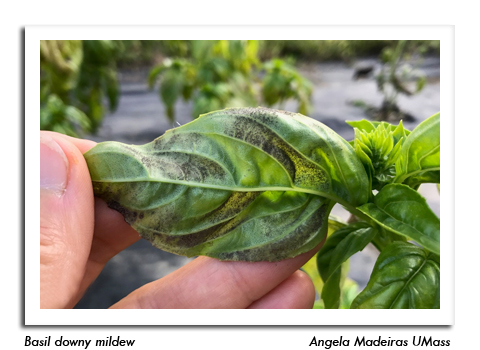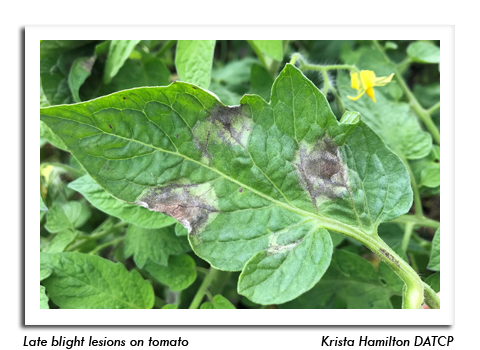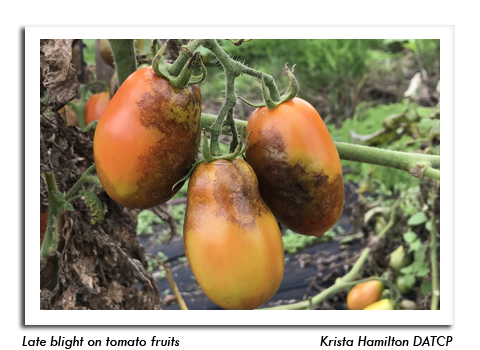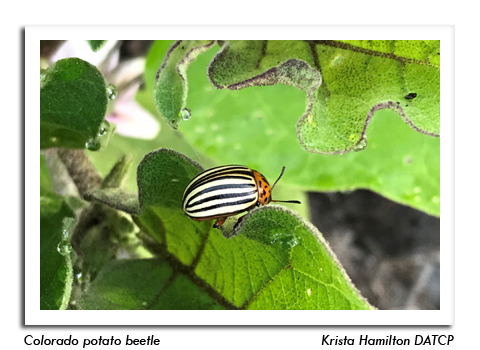
 |
|
|
Vegetables
Volume 65 Number 18 Date 11/12/2020 VEGETABLE DISEASES - DATCP plant pest specialists visited 29 CSA farms and community gardens near La Crosse, Madison, Milwaukee and Hudson on a biweekly basis this season to monitor for 30 new and invasive vegetable diseases and insects. Sixty-seven symptomatic vegetable samples were collected and submitted to the Plant Industry Bureau Lab for testing. Although none of targeted pathogens were detected, other notable diseases found in 2020 were: basil downy mildew on basil, tobacco ringspot virus (TRSV) on tomato, and squash mosaic virus on zucchini. BASIL DOWNY MILDEW - This aggressive foliar disease was confirmed in late August in Pierce and St. Croix counties. Basil downy mildew spreads via wind-dispersed spores, rapidly infecting entire fields and causing complete plant loss. The pathogen is often present on greenhouse-grown basil in garden centers in the spring, though it may not progress until late summer. Purchasing disease-free plants, promoting airflow, and frequent monitoring of the crop so harvest can occur quickly once the mildew appears are all important controls. Planting resistant varieties (not sweet basil) is also recommended. TOBACCO RINGSPOT VIRUS - Tomatoes with very striking virus-like symptoms were screened for several viruses of concern to greenhouse growers and exporters. Three heirloom tomato samples from La Crosse County showing oval-shaped blisters on the fruits were diagnosed with tobacco ringspot virus (TRSV). Tobacco ringspot virus infects a wide range of woody and herbaceous plants, including many common ornamental plants and weeds. The virus is frequently seed-transmitted or spread by plant sap. Nematodes and honey bees can also vector TRSV. Unlike the emerging threat tomato brown rugose fruit virus which exhibits similar symptoms, TRSV reportedly causes only minor damage and does not spread rapidly. SQUASH MOSAIC VIRUS - Zucchini plants in a La Crosse County community garden tested positive for this virus. Squash mosaic virus (SqMV) is common on cucurbits and produces mosaic, rugosity and distortion symptoms. SqMV also infects common lambsquarters and other weeds in the Chenopodiaceae family. This seed-transmitted virus is spread by cucumber beetles and in plant sap on hands and tools. The virus can overwinter on perennial weeds. Disease management starts with using clean seed, practicing good sanitation, minimizing weeds, and controlling insect pests. LATE BLIGHT - Disease pressure decreased significantly in 2020 due to dry late summer weather, with detections in only three counties, compared to 18 counties in 2019. The state's first infected commercial potato field was confirmed in Adams County on August 10 by the UW Plant Pathology Department. Two additional cases of late blight, both on tomato, were diagnosed during the remainder of the season, one in Pierce County on August 20 and a second in St. Croix County on September 15. All samples tested by UW from Wisconsin were the US-23 pathogen genotype. At the DATCP Plant Industry Bureau Lab, 24 tomato samples and two potato samples were also screened for late blight. This disease was not detected, but testing found septoria leaf and stem blight was very common on tomato (12 positive samples), followed by early blight (3 positives), and Fulvia leaf mold in a greenhouse (1 positive). TOMATO BROWN RUGOSE FRUIT VIRUS - Four symptomatic tomato samples were submitted by a local USDA APHIS PPQ inspector as part of a national survey for tomato brown rugose fruit virus (ToBRFV). The tomatoes were screened using immunostrips and no positives were found. In 2019, APHIS imposed import restrictions on tomato and pepper fruit, transplants and seed lots from all countries where ToBRFV exists. ToBRFV has caused significant economic losses in greenhouse production of tomatoes. This newly identified virus was detected and eradicated from Arizona and California greenhouses in 2018 and 2019. COLORADO POTATO BEETLE - Overwintered beetles were unusually abundant this spring. Damaging populations were reported by May 25 from several western and northern Wisconsin CSAs where the beetles caused severe defoliation of young potato and eggplant crops. Control of the overwintered adults and resulting first-generation larvae required persistent scouting every few days until the peak colonization period ended in June. -- Anette Phibbs & Sam Fieweger, DATCP Plant Industry Lab 
.jpg)



|
|
|